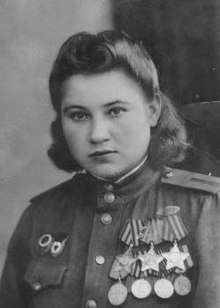Matrena Necheporchukova
Matrena Semyonovna Nazdrachev (Russian: Матрёна Семёновна Нечепорчукова; Necheporchukova; 3 April 1924 – 22 March 2017) was a medic in the 100th Guards Infantry Regiment of the 35th Guards Rifle Division of the Red Army during World War II. On 15 May 1946 she was awarded the Order of Glory 1st Class, making her one of only four women to become a full cavalier of the award.
Matrena Semyonovna Necheporchukova | |
|---|---|
 | |
| Native name | Матрёна Семёновна Нечепорчукова |
| Born | 3 April 1924 Volchiy Yar, Zmiyevskoy uezd, Kharkov Governorate, Ukrainian SSR |
| Died | 22 March 2017 (aged 92) Stavropol, Russian Federation |
| Allegiance | |
| Service/ | Red Army Medical Service |
| Years of service | 1943–1945 |
| Rank | Starshina |
| Unit | 100th Guards Rifle Regiment, 35th Guards Rifle Division |
| Battles/wars | Eastern Front of World War II |
| Awards | Order of Glory 1st Class Medal "For Courage" Florence Nightingale Medal |
Early life
Necheporchukova was born in the village of Volchiy Yar to a Ukrainian peasant family. After her parents passed away she lived in a boarding school. She later worked as a nurse at a local hospital after graduating from the Balakleyevskaya Obstetrical Nursing School in 1941. In 1943, at the age of 19, she joined the Red Army. The Germans had occupied her town soon after the start of the war, and the Red Army had rejected her because she was too young at the start of the war.[1][2]
Military career
Necheporchukova managed to join the Communist Party and enlist Red Army as a medic in 1943 shortly after German forces were expelled from her hometown. She was deployed to her regiment in the spring and on her first day of battle she provided first aid to fifteen wounded soldiers. After the Soviet offensive in Kiev she crossed the Dniper in October with a medical company under heavy enemy fire. After the river crossing she carried the wounded from battle to rafts despite heavy presence of enemy mortar, artillery, shelling, and bombing attacks. For nearly a week she continued doing so with little sleep and was soon awarded the Medal "For Courage".[2][3][4]
When Soviet forces crossed the Vistula river in Poland on 1 August 1944, Necheporchukova was the first person from her medical company to enter the river and head toward the bridgehead on the west shore, where heavy fighting was already taking place. After the crossing she provided first aid to roughly sixty soldiers, twenty-six of whom she carried off the battlefield to safety in an area where artillery fire could not reach. For doing so she was awarded the Order of Glory 3rd Class later that month.[3]
During the Vistula-Oder offensive in January 1945, Necheporchukova stayed in Radom behind the rest of the unit with several other medics to look after roughly thirty wounded soldiers while waiting for ambulances to pick them up. On 18 January a group of Wehrmacht soldiers that ran past Soviet lines raided the shelter where the injured were staying, but she and the other medics managed to repel the attack. One day later the ambulances arrived and she left to return her regiment. In a separate incident she provided first aid to fifty-one wounded soldiers on the bank of the Oder, twenty-seven of whom were seriously injured. For her actions in Radom and Oder she was awarded the Order of Glory 2nd class.[1][3]
During the Battle of Berlin as well as the crossings of the Spree and Oder River Necheporchukova carried 78 wounded soldiers off the battlefield under heavy enemy fire, refusing to go to the hospital after sustaining a shrapnel wound to her leg. In Berlin she killed several German soldiers after they began approaching towards the wounded soldiers she was treating. For her actions under heavy fire in those offensives she was awarded her third Order of Glory, making her a full bearer of the award.[1][3]
Postwar life
After the end of the war Necheporchukova married Viktor Stepanovich Nazdrachev, who also fought in the Second World War. From 1945 to 1950 she and her husband lived in East Germany before moving to Dmitrievskoe village in Stavropol where they lived from 1950 to 1965, after which they moved to Krasnogvardeyskoye where they lived until 1977. In 1973 she was awarded the Florence Nightingale Medal by the Red Cross for her dedication in the salvation of the wounded during the war. In 1977 she moved to the city of Stravpol, where she lived for the remainder of her life. In 2016 on the date of her 91st birthday she received a phone call from Russian president Vladimir Putin thanking her for her courage in the war.[2][5][6]
Awards and honors
- Order of Glory (all three classes)[1]
- Order of the Patriotic War 1st Class[2]
- Medal "For Courage"[2]
- Florence Nightingale Medal[7]
- Campaign and jubilee medals[8]
- Honorary citizen of Stavropol[9]
See also
- Nina Petrova
- Danute Staneliene
- Nadezhda Zhurkina
References
- "Нечепорчукова (Наздрачёва) Матрёна Семёновна" [Necheporchukova (Nazdracheva) Matryona Semyonovna]. warheroes.ru (in Russian). Retrieved 2018-05-16.
- "Нечепорчукова Матрёна Семёновна : Министерство обороны Российской Федерации" [Matryona Semyonovna Necheporchukova: Ministry of Defense of the Russian Federation]. encyclopedia.mil.ru (in Russian). Retrieved 2018-05-16.
- Janina, Cottam (1998). Women in War and Resistance: Selected Biographies of Soviet Women Soldiers. Newburyport, MA: Focus Publishing/R. Pullins Co. ISBN 1585101605. OCLC 228063546.
- "Наздрачёва (Нечепорчукова) Матрёна Семёновна". histrf.ru (in Russian). Retrieved 2018-06-25.
- "Путин поздравил полного кавалера ордена Славы Матрену Нечепорчукову с днем рождения". ТАСС (in Russian). Retrieved 2018-05-16.
- "Матрена Нечепорчукова". polit.ru. Retrieved 2018-05-16.
- International Review of the Red Cross, May 1973, Thirteenth year - No. 146 pg 243
- "Матрена Семеновна Наздрачева". ставпополь.рф (in Russian). Retrieved 2018-05-16.
- "Почетные граждане Ставрополя". www.dumast.ru (in Russian). Retrieved 2018-05-16.